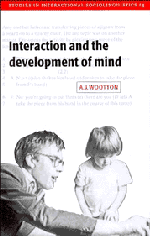Book contents
6 - General skills involved in early requesting
Published online by Cambridge University Press: 24 August 2009
Summary
This chapter is divided into three sections. In the first two I shall be considering research from social linguistics and developmental psychology respectively, research which has been influential in shaping the picture that has been formed of the skills of the two-year-old. The aim here is to set the main findings which I have reported into the context of these two traditions, so as to bring out relevant consistencies and tensions. In the third section of the chapter a summary is presented of the overall argument emerging from this book, focusing especially on its implications for connecting the study of cognitive and interactional processes.
Social linguistics and politeness
Over the last 20 years there has been a steady accumulation of information about the ways in which young children make requests. In chapter 2 I described the main developmental changes in this regard between the ages of 12 and 24 months. Here the focus will mainly be on the period immediately after 24 months, and in particular on research which has brought out ways in which the child's choice of some particular way of requesting is sensitive to social considerations. By 24 months all normal children are capable of producing requests in a variety of linguistic guises. We have seen within my own data, for example, that by then Amy standardly made use of imperative constructions, ones framed with the verb ‘want’ and ones framed with ‘like’.
- Type
- Chapter
- Information
- Interaction and the Development of Mind , pp. 175 - 208Publisher: Cambridge University PressPrint publication year: 1997



